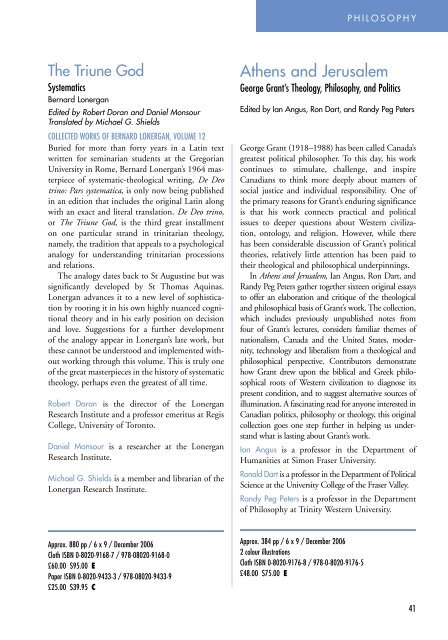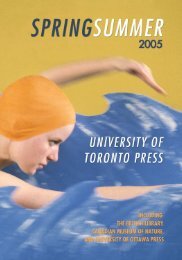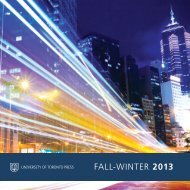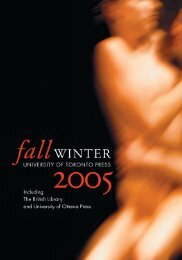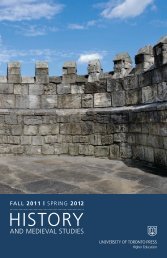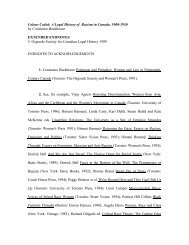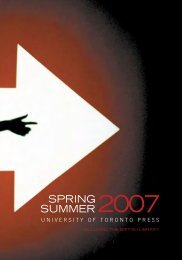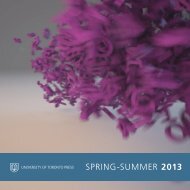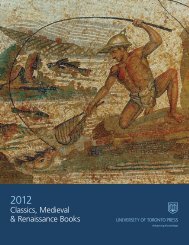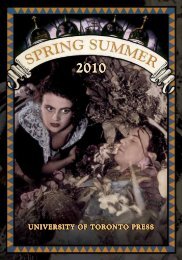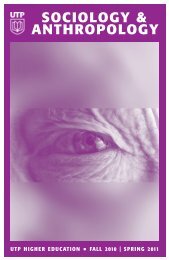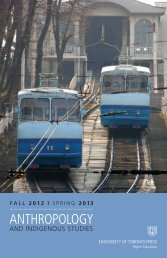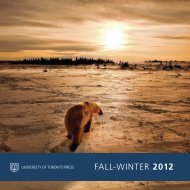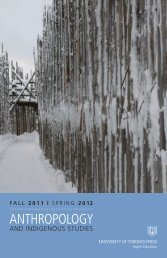Fall/Winter 2006 - University of Toronto Press Publishing
Fall/Winter 2006 - University of Toronto Press Publishing
Fall/Winter 2006 - University of Toronto Press Publishing
Create successful ePaper yourself
Turn your PDF publications into a flip-book with our unique Google optimized e-Paper software.
P H I L O S O P H Y<br />
The Triune God<br />
Systematics<br />
Bernard Lonergan<br />
Edited by Robert Doran and Daniel Monsour<br />
Translated by Michael G. Shields<br />
COLLECTED WORKS OF BERNARD LONERGAN, VOLUME 12<br />
Buried for more than forty years in a Latin text<br />
written for seminarian students at the Gregorian<br />
<strong>University</strong> in Rome, Bernard Lonergan’s 1964 masterpiece<br />
<strong>of</strong> systematic-theological writing, De Deo<br />
trino: Pars systematica, is only now being published<br />
in an edition that includes the original Latin along<br />
with an exact and literal translation. De Deo trino,<br />
or The Triune God, is the third great installment<br />
on one particular strand in trinitarian theology,<br />
namely, the tradition that appeals to a psychological<br />
analogy for understanding trinitarian processions<br />
and relations.<br />
The analogy dates back to St Augustine but was<br />
significantly developed by St Thomas Aquinas.<br />
Lonergan advances it to a new level <strong>of</strong> sophistication<br />
by rooting it in his own highly nuanced cognitional<br />
theory and in his early position on decision<br />
and love. Suggestions for a further development<br />
<strong>of</strong> the analogy appear in Lonergan’s late work, but<br />
these cannot be understood and implemented without<br />
working through this volume. This is truly one<br />
<strong>of</strong> the great masterpieces in the history <strong>of</strong> systematic<br />
theology, perhaps even the greatest <strong>of</strong> all time.<br />
Robert Doran is the director <strong>of</strong> the Lonergan<br />
Research Institute and a pr<strong>of</strong>essor emeritus at Regis<br />
College, <strong>University</strong> <strong>of</strong> <strong>Toronto</strong>.<br />
Daniel Monsour is a researcher at the Lonergan<br />
Research Institute.<br />
Michael G. Shields is a member and librarian <strong>of</strong> the<br />
Lonergan Research Institute.<br />
Athens and Jerusalem<br />
George Grant’s Theology, Philosophy, and Politics<br />
Edited by Ian Angus, Ron Dart, and Randy Peg Peters<br />
George Grant (1918–1988) has been called Canada’s<br />
greatest political philosopher. To this day, his work<br />
continues to stimulate, challenge, and inspire<br />
Canadians to think more deeply about matters <strong>of</strong><br />
social justice and individual responsibility. One <strong>of</strong><br />
the primary reasons for Grant’s enduring significance<br />
is that his work connects practical and political<br />
issues to deeper questions about Western civilization,<br />
ontology, and religion. However, while there<br />
has been considerable discussion <strong>of</strong> Grant’s political<br />
theories, relatively little attention has been paid to<br />
their theological and philosophical underpinnings.<br />
In Athens and Jerusalem, Ian Angus, Ron Dart, and<br />
Randy Peg Peters gather together sixteen original essays<br />
to <strong>of</strong>fer an elaboration and critique <strong>of</strong> the theological<br />
and philosophical basis <strong>of</strong> Grant’s work. The collection,<br />
which includes previously unpublished notes from<br />
four <strong>of</strong> Grant’s lectures, considers familiar themes <strong>of</strong><br />
nationalism, Canada and the United States, modernity,<br />
technology and liberalism from a theological and<br />
philosophical perspective. Contributors demonstrate<br />
how Grant drew upon the biblical and Greek philosophical<br />
roots <strong>of</strong> Western civilization to diagnose its<br />
present condition, and to suggest alternative sources <strong>of</strong><br />
illumination. A fascinating read for anyone interested in<br />
Canadian politics, philosophy or theology, this original<br />
collection goes one step further in helping us understand<br />
what is lasting about Grant’s work.<br />
Ian Angus is a pr<strong>of</strong>essor in the Department <strong>of</strong><br />
Humanities at Simon Fraser <strong>University</strong>.<br />
Ronald Dart is a pr<strong>of</strong>essor in the Department <strong>of</strong> Political<br />
Science at the <strong>University</strong> College <strong>of</strong> the Fraser Valley.<br />
Randy Peg Peters is a pr<strong>of</strong>essor in the Department<br />
<strong>of</strong> Philosophy at Trinity Western <strong>University</strong>.<br />
Approx. 880 pp / 6 x 9 / December <strong>2006</strong><br />
Cloth ISBN 0-8020-9168-7 / 978-08020-9168-0<br />
£60.00 $95.00 E<br />
Paper ISBN 0-8020-9433-3 / 978-08020-9433-9<br />
£25.00 $39.95 C<br />
Approx. 384 pp / 6 x 9 / December <strong>2006</strong><br />
2 colour illustrations<br />
Cloth ISBN 0-8020-9176-8 / 978-0-8020-9176-5<br />
£48.00 $75.00 E<br />
41


